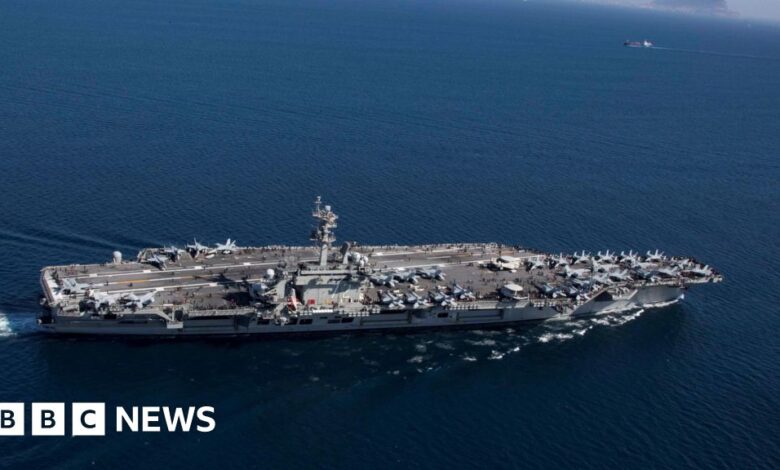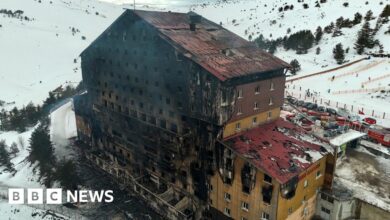US sends submarine to Middle East as tensions rise

The United States has sent a guided missile submarine to the Middle East amid heightened tensions in the region.
Defense Secretary Lloyd Austin also said an aircraft carrier en route to the region would get there more quickly.
The move comes in response to fears of a wider regional conflict following the recent assassinations of senior Hezbollah and Hamas leaders.
This demonstrates the US’s determination to defend Israel from any Iranian attack – Mr Austin said the US would “take every possible step” to protect its ally.
Iran is being closely watched for any signs of how and when it might respond to the assassination of top Hamas political leader Ismail Haniyeh in Tehran on July 31.
The Iranians blame Israel for the assassination of Mr Haniyeh on their soil and have vowed to punish him. Israel has not commented but is believed to be behind the incident.
In a statement on Sunday, The Pentagon said Mr Austin had dispatched the guided-missile submarine USS Georgia to the area.
They also ordered the USS Abraham Lincoln aircraft carrier strike group, carrying F-35C fighter jets, to speed up its journey there. The ship was on its way to replace another US ship in the area.
It is still unclear what Iran is planning.
Meanwhile, another attack on Israel could come from Hezbollah, the Iran-backed militia and political movement in Lebanon.
The group has vowed to respond to the assassination of senior Israeli commander Fuad Shukr, which occurred just hours before Mr Haniyeh’s killing, in a southern suburb of Beirut.
Professor Mehran Kamrava from Georgetown University in Qatar said the US’s public deployment of submarines “is aimed at deterring Iran and Hezbollah”.
But he said that privately, “there may be some indications that Iran is actually up to something and is about to attack.”
Several passenger airlines have canceled flights to airports in the region due to concerns about the threat.
German airline Lufthansa said on Monday it would suspend flights to Tel Aviv in Israel, Lebanon’s capital Beirut, Jordan’s capital Amman, Erbil in Iraq and Iran’s capital Tehran until August 21 “based on current security analysis”.
Swiss Air has also canceled flights scheduled to Tel Aviv and Beirut around the same time.
Meanwhile, according to AFP news agency, Air France has extended the suspension of flights to Beirut – which began on July 29 – until Wednesday.
Other airlines, including AirBaltic and EasyJet, had previously announced they would suspend flights to the region.
When Iran previously launched an attack on Israel following an attack on its consulate in Syria in April, it did so using hundreds of drones and missiles.
The Biden administration believes a ceasefire in Gaza and the release of Israeli hostages would be the best way to ease tensions in the region and has called for a resumption of talks on Thursday.
But on Sunday evening, Hamas responded to US efforts to revive ceasefire talks by saying Israel must be forced to implement the deal that was on the table.
Hamas says any resumption of ceasefire talks on the Gaza conflict must be based on its previous stance rather than holding new rounds of talks.
However, this statement shows that there was consent in principle to participate.
Washington has previously blamed Hamas for the failure of the talks.
But Israeli media reports say the US increasingly sees Israeli Prime Minister Benjamin Netanyahu as partly to blame – because he is accused of appeasing far-right members of his coalition who oppose the deal.
Last week, for the first time, the White House publicly criticized one of the coalition’s leaders, Finance Minister Bezalel Smotrich.
Mr Smotrich has urged Israel to reject US calls for ceasefire talks, saying it would be a surrender to Hamas. White House national security spokesman John Kirby said Mr Smotrich was “completely wrong” and accused him of making false statements.
Meanwhile, the leaders of Britain, France and Germany have unanimously called for a resumption of ceasefire talks.
“We agreed that there can be no further delay,” said a statement from British Prime Minister Sir Keir Starmer, French President Emmanuel Macron and German Chancellor Olaf Scholz.
“We have been working with all parties to prevent escalation and will make every effort to reduce tensions and find a path towards stability.”



